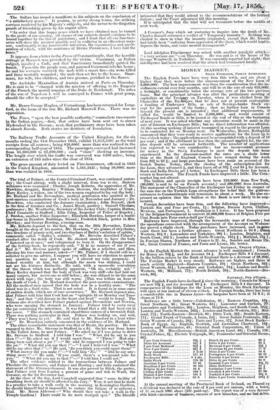The trial of Palmer, at the Central Criminal Court, was
continued yester- day ; the Court sitting, with a slight interval, from ten to six. Sixteen witnesses were examined : Charles Joseph Roberts, the apprentice of Mr.
Hawkins, druggist, Rugeley ; William Stevens, the stepfather of k ; Mary Keeley, a widow., one of the two women employed to lay out the y ; Dr. Harland and Mr. Devonshire, medical gentlemen who assisted at the poa-mortem examinations of Cook's body in November and January '• -Dr. Monekton, who conducted the January examination • ' John Boycott, clerk to the firm of Gardner and Co. ; James Myatt, postbo ; Samuel 'Cheshire; postmaster ; Mr. Weatherby, Secretary. of the Jockey Club Captain Hatton, Chief Constable at Stafford ; Ellis Crisp, Inspector of Police at Rugeley ; J. Burden, another Police Inspector ; Elizabeth Hawkes, keeper of a board- ing-house in Beaufort Buildings, Strand ; Frederick Slack, porter to Mrs. Hawke; ; and George Herring, a racing-man. Mr. Roberts deposed to the fact that on the 20th November, Palmer. bought at the shop of his master, .fr. Hawkins, " six grains of strychnine, two drachms of prussic acid, and two drachms of Batley's solution of opirlm,' " commonly called " Batley's sedative." Mr. Stevens described Palmer's conduct after the death of Cook. He showed anxiety to have the body " fastened up at once," and volunteered to bury it. On the disappearance of the betting-book, he repeatedly said, " It is no manner of use if you find it." Mr. Stevens quietly spoke of calling in a solicitor, and then, altering his tone and manner, asked—" Mr. Palmer, if I should call in a solicitor to give me advice, I suppose you will have no objection to answer any question he may put to you. I altered my tone purposely. I looked steadily at him, but although the moon was shining, I could not see his features distinctly. He said, with a spasmodic convulsion of the throat which was perfectly apparent, Oh no, certainly not.' Mary Keeley deposed that the body of Cook was very stiff—she had laid out Many corpses, but never one so stiff before ; she was obliged to tie the arms down with tape ; the body was still warm. [This was within an hour of the death of Cook.] Dr. Harland described the post-mortem examinations. All the medical men agreed that the body was m a healthy state. "The blood was in a fluid state. That is not usual. It is found so in some cases of sudden death, which are of rare occurrence." Mr. Harland deposed also, that Palmer told him that Cook had an "epileptic fit on Monday and Tues- day," and that "old disease in the heart and head" would be found. The -witness also described how Palmer pushed against Devonshire and Newton, who were opening the stomach in January. Palmer tried to carry away the jar containing the intestines. It was found that a slit had been cut in the cover. " The stomach contained aboutthree ounces of a brownish fluid. There was nothing particular in that. Palmer was looking on, and said, 4 They won't hang us yet.' He said that to Mr. Bam i ford n a loud whis- pei." Dr. Monekton entirely concurred in the evidence of Dr. Harland. The other remarkable statement was that of Myatt, the postboy. He was engaged to drive Mr. Stevens to Stafford in a fly. On his way from home to the Talbot Arms, he met Palmer. "He asked me if I was going to drive Mr. Stevens to Stafford. I told him I was." "What did he say to you then ?"—" He asked me if I would upset them. " Them ?' Had any- thing been said about a jar ?"—" He said he supposed I was going to take the jar." " What did you say then ?"—" I said I believed I was." . What did he say after that ?"—" He said, 'Do you think you could upset them?' " " What answer did you make ?"—" I told him No.' " " Did he say an more ?"—" He said, If you could, there's a ten-pound note for you.' ". "What did you say to that ?"—" I told him I could not."
The other evidence related to the transactions between Palmer and Cheshire the postmaster, and Palmer and Herring ; and fully sustained the Statement of the Attorney-General. It was also proved by Slack, the porter, that Palmer sent from London a present of game and fish to Ward, the Coroner, on the 1st December last.
At the close of the day, Lord Campbell suggested that " some facility of breathing fresh air should be afforded to the Jury." Were it not that he made it a practice to take a walk early in the morning in Kensington Gardens, he should himself find it impossible to endure the fatigue of so arduous a trial. Mr. Baron Alderson—" Why should they not take a walk in the Temple Gardens ? There could be no more tranquil spot." The Sheriffs intimated that they would attend to the recommendations of the learnett Judges ; and the Court adjourned till this morning.
It is anticipated that the trial will not terminate before the middle of next week.


























 Previous page
Previous page